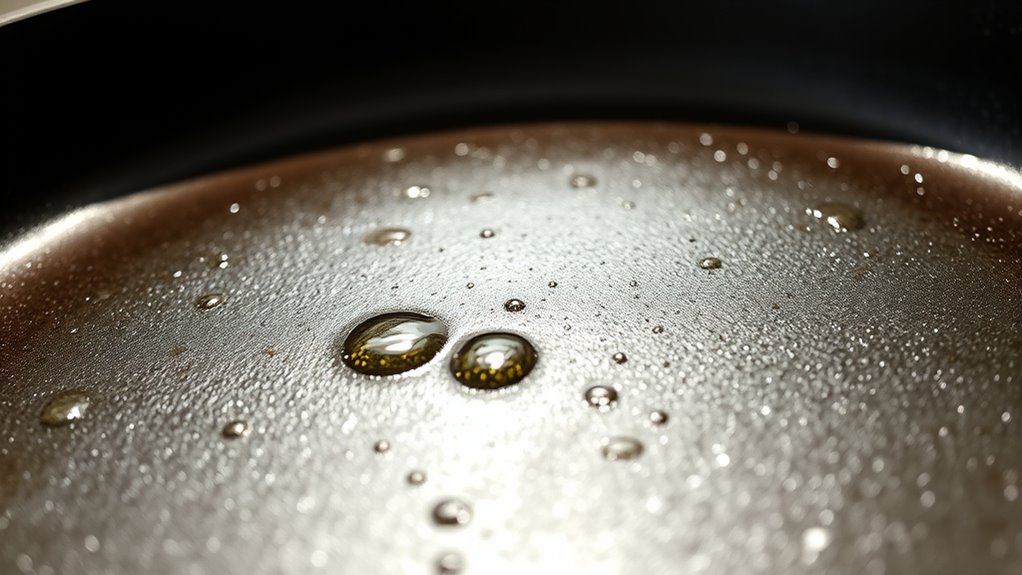Many believe you must avoid soap or harsh scrubbing to keep your cast iron seasoned, but that’s a myth. Using mild dish soap occasionally won’t harm the seasoning if you reapply oil afterward. Gentle brushes or sponges are enough for cleaning, and even steel wool can be used carefully to remove rust. Proper drying and seasoning maintenance prevent rust and preserve your skillet’s non-stick surface. Keep going to discover simple strategies that protect your cast iron long-term.
Key Takeaways
- Occasional use of mild soap won’t damage seasoning if re-oiled afterward.
- Gentle cleaning tools preserve seasoning better than aggressive scrubbing.
- Rust can be removed with steel wool, then re-seasoned to restore surface protection.
- Proper drying and applying a thin oil layer prevent rust and maintain seasoning.
- Regular maintenance and re-seasoning extend skillet lifespan without harsh cleaning methods.

Have you ever heard conflicting advice about cleaning your cast iron skillet? It can be confusing trying to figure out what’s right, especially when it comes to maintaining the seasoning and preventing rust. The truth is, proper seasoning maintenance is key to keeping your skillet in top shape, and understanding what to do—and what not to do—can make all the difference. Many myths suggest that you should avoid soap or never wash your cast iron, but these ideas can actually harm your skillet’s surface if misunderstood. Instead, regular cleaning that preserves the seasoning layer is essential for rust prevention and ensuring your skillet stays non-stick and durable over time.
The first myth you might encounter is that you should never use soap on your cast iron. Some believe soap strips away the seasoning, ruining your skillet’s non-stick surface. In reality, a small amount of mild dish soap used occasionally won’t damage the seasoning if you reapply a light coat of oil afterward. Proper seasoning maintenance involves cleaning your skillet to remove food residue without stripping away the entire layer of baked-on oil. After washing, it’s *essential* to dry your skillet thoroughly to prevent moisture from lingering. Moisture is the enemy when it comes to rust prevention, so wipe your skillet dry immediately or heat it briefly on the stove to evaporate any remaining water.
A small amount of soap won’t damage your cast iron if you reapply oil afterward.
Another common myth is that you should never scrub your cast iron with steel wool or abrasive pads. While gentle cleaning tools like a brush or sponge are preferable, using a bit of steel wool occasionally isn’t going to ruin your skillet if done carefully. It can help remove stubborn rust or stuck-on food without stripping all the seasoning if you follow up with proper re-seasoning. The key to rust prevention is keeping the surface well-seasoned and dry. If rust does form, you can remove it with steel wool, then reseason your skillet to restore its protective coating.
You might also hear people say that you should store your cast iron in a completely dry environment and avoid any contact with moisture. While it’s true that moisture causes rust, storing your skillet in a dry place isn’t enough. Regularly inspecting and maintaining the seasoning, especially after each use, helps form a protective barrier that repels moisture. Applying a thin layer of oil after cleaning creates a natural rust-proof surface. So, don’t just leave your skillet hanging without care; a little ongoing seasoning maintenance is your best defense against rust and a long-lasting, well-seasoned cast iron skillet.
Additionally, understanding the importance of seasoning buildup can help you maintain a durable, non-stick surface over time, reducing the need for aggressive cleaning methods.
Frequently Asked Questions
Can I Use Soap on My Seasoned Cast Iron?
Yes, you can use dish soap on your seasoned cast iron, but do so sparingly. Modern dish soaps are gentle and won’t strip away your seasoning if used occasionally. If you want to preserve your seasoning, avoid frequent soap use and rinse thoroughly. Afterward, dry your pan well and reapply a light coat of oil if needed. This helps keep your cast iron well-seasoned and ready for cooking.
Is It Okay to Soak Cast Iron Overnight?
No, you shouldn’t soak your cast iron overnight. Prolonged soaking can strip away your seasoning and cause rust. Instead, focus on proper cleaning techniques, like wiping with a damp cloth or using a small amount of soap if needed, then thoroughly drying and reapplying oil to maintain your seasoning. This way, you preserve the non-stick surface and keep your cast iron in great shape for years to come.
How Often Should I Reseason My Cast Iron Skillet?
You should reseason your cast iron skillet every few months or when the surface starts to look dull and lose its non-stick quality. Regular seasoning frequency depends on how often you cook with it, but as part of maintenance tips, wipe it with a light coat of oil after each use. This keeps the seasoning intact and prevents rust, ensuring your skillet stays in top condition for years.
Can I Cook Acidic Foods Without Damaging the Seasoning?
Yes, you can cook acidic foods in your cast iron without damaging the seasoning if you do so occasionally and for shorter periods. Acidic foods like tomatoes or citrus can erode seasoning over time, so it’s best to preserve your seasoning by not cooking them frequently. Use a well-seasoned skillet, and clean it properly afterward to maintain the seasoning preservation and avoid stripping the protective layer.
What’s the Best Way to Remove Rust From Cast Iron?
To remove rust from cast iron without damaging the seasoning, use a mixture of coarse salt and a little water or white vinegar. Scrub gently with a brush or steel wool, focusing on rusted areas. Rinse thoroughly, dry completely, then reapply a light layer of oil to restore seasoning. This method effectively tackles rust while preserving your cast iron’s seasoned surface for long-lasting use.
Conclusion
Now that you know the truth behind cast iron cleaning myths, you can confidently keep your skillet seasoned like a seasoned chef’s secret. Imagine that glossy black surface as a mirror reflecting your culinary artistry, untouched by harsh soaps or scrubbing. With gentle care, your cast iron becomes a trusted kitchen companion, ready to sizzle and sear for years to come. Keep the myths at bay, and let your skillet’s natural beauty and flavor shine through each meal.









